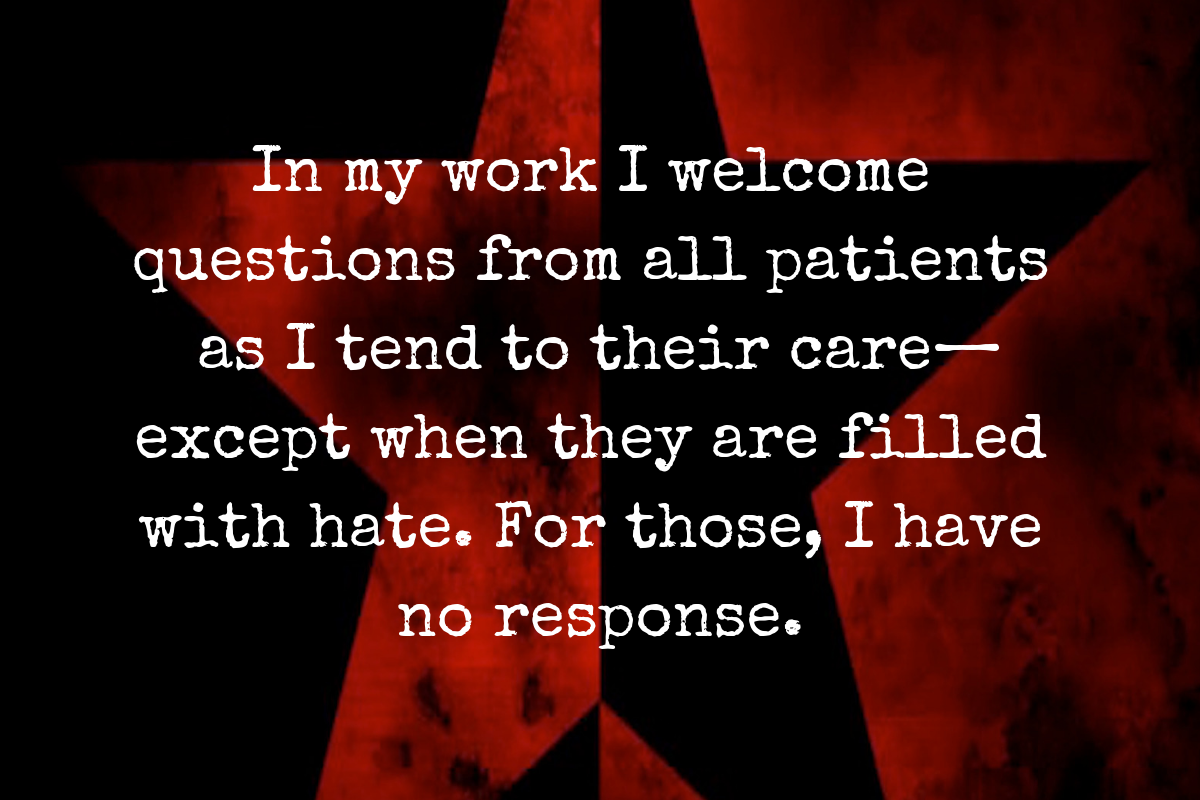
By Maria Alonso-Garcia
I heard something I did not expect to hear from a patient as part of my bedside care.
As a nurse, I can expect my day to be filled with rewarding experiences and challenges such as starting an IV site, placing a Foley catheter, monitoring someone’s heart rhythm, providing health education, and even lending a listening ear.
But this recent day was different.
After asking for my citizenship status, a patient did not agree with my decline to discuss such topics.
“I know who you are, you must be one of those, all you people are the same! That is why Trump is building that wall!” Then the patient continued to shout derogatory terms.
The patient was informed such behavior is not tolerated, left the room, and my leadership was notified.
I felt violated in my rights as a person, in my rights for privacy, and in my requirement of mutual respect. The words not only represented prejudice and discrimination. They eluded a lifetime of history and the journey of our ancestors.
Given the current political and social environment, hatred is empowered on a daily basis. Now more than ever in several years as a nurse, have I not only seen hatred in media, but also experienced personally such derogatory views.
The Southern Poverty Law Center recently reported a 30 percent rise in hate groups in the past seven years, with a seven percent increase in 2018. More than 1,000 hate groups exist in this country, the highest in 20 years.
Hateful rhetoric and speech —as I witnessed— also moves into action. According to the FBI, hate crimes rose 17 percent in 2017. And the Bureau of Justice reports that 50 percent of hate crimes are never reported.
These are dangerous daily circumstances.
Such words spoken by a patient in a healthcare setting or a president at a political rally, demonstrate the sensationalism around the need for “the wall” as outrageous and disgraceful.
Many express disbeliefs in their cynical remarks about the realities of hundreds of families trying to cross at the border.
But for so many trying to cross the border, the truth is, when you live under circumstances where you have no future, where you might be persecuted and live in uncertainty and fear for your safety and that of your family, you make the tearing decision to abandon roots and travel to the unknown, a promised land where not everyone might welcome you.
This is the experience of many immigrants and their families.
Forced to abandon roots, many are willing to cross rivers, walk through deserts under extreme conditions, embark in a voyage with no guarantee of survival or success. This is a representation of the human spirit.
Ignorance of this truth is part of what causes hate speech—directed at anyone who appears to be non-white even in a nation of diversity.
Nurses and all healthcare workers are exposed to such intolerant ideologies, as well as physical violence. According to the American Nurses Association, more than 20 percent of registered nurses report being victims of physical assault and more than half report verbal abuse over the course of a year.
The Joint Commission advises that in each episode of violence or possible threat, health care workers notify the organization’s leadership, internal security, and law enforcement if needed.
The U.S. Department of Labor identifies workplace violence as an action —either verbal, written, or physical— which could cause or is intended to cause death or bodily injury to self or others. Workplace violence also includes abusive, intimidating or harassing behavior and threats.
In healthcare, the most common type of violence comes from patients, family, or visitors towards a healthcare worker. Every organization must specifically define acceptable and unacceptable behavior and the degree of action or verbal input that will trigger an action plan.
While violence against healthcare workers can occur in any setting and all types of healthcare workers have been victims of violence to different degrees, the American Nurses Association supports a zero tolerance policy for violence against nurses, including verbal abuse.
A new initiative, Time’s Up Healthcare, launched recently with the mission “to unify national efforts to bring safety, equity, and dignity to our healthcare workplace.”
According to the group founded by 48 female doctors, nurses, researchers, administration, medical and healthcare professionals across the country, “As our effort builds, we are mindful of supporting all those who are vulnerable to bias, harassment, and discrimination, whether due to gender, gender identity, sexual orientation, race, ethnicity, country of origin, disability, or any other factor.” They offer tools and resources for individuals and organizations.
Concrete suggestions for healthcare organizations from The Joint Commission include establishing a clear definition of workplace violence and enabling workplace violence reporting, including verbal abuse and tracking of all incidents. Staff need to be trained in de-escalation as well as self-defense, and appropriate follow-up and support to victims and anyone affected is needed.
As part of a culture of safety, every workplace needs a culture of tolerance, supported through clear policies, procedures and systems in place that support and foster respect free of any type of violence.
I felt grateful for my coworkers working alongside me that day and their support.
At the end of that day, another patient showed me the joys of nursing. Being a hospice patient, he held my hand as I held his and listened to his story. He looked me in the eye and complimented my eye color; I complimented his as well and we both smiled. His were hazel color and mine dark brown.
In my work I welcome questions from all patients as I tend to their care—except when they are filled with hate. For those, I have no response.
***
Maria Alonso-Garcia BSN, RN-BC, is a Board Certified Registered Nurse at Rush Oak Park Hospital and a Public Voices Fellow with The OpEd Project.


